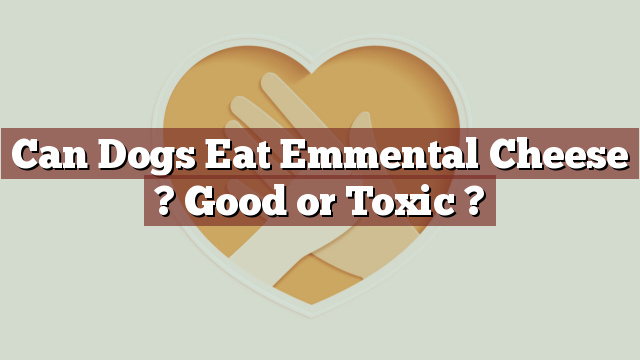Can Dogs Eat Emmental Cheese? Good or Toxic?
Knowing what foods are safe for our furry companions is crucial to their overall health and well-being. In this article, we will explore whether dogs can safely consume Emmental cheese, a popular type of Swiss cheese known for its distinctive flavor and hole-filled texture. We will delve into the nutritional value of Emmental cheese for dogs, discuss its safety, potential risks, and benefits, and conclude with recommendations on what to do if your dog happens to eat this cheese.
Nutritional Value of Emmental Cheese for Dogs
Emmental cheese, like other dairy products, contains essential nutrients that are beneficial for our dogs. It is a rich source of protein, which is vital for building and repairing muscles, tissues, and cells. Additionally, Emmental cheese provides essential vitamins such as vitamin A, vitamin B12, and calcium, which are important for proper growth, bone health, and immune function.
Can Dogs Eat Emmental Cheese? Is it Safe or Toxic?
Can dogs eat Emmental cheese? While small amounts of Emmental cheese may not pose an immediate danger to dogs, it is important to exercise caution when offering this cheesy delight to your furry friend. Emmental cheese, like many other types of cheese, is high in fat and can lead to gastrointestinal upset, including diarrhea and vomiting, if consumed in large quantities. The high-fat content can also contribute to weight gain and obesity in dogs. Moreover, some dogs may be lactose intolerant, making Emmental cheese difficult for them to digest.
It’s worth noting that Emmental cheese, when consumed in excess, can also lead to pancreatitis in dogs. Pancreatitis is a condition characterized by inflammation of the pancreas and can be extremely painful and potentially life-threatening for our canine companions.
Potential Risks and Benefits of Feeding Emmental Cheese to Dogs
While Emmental cheese does offer some nutritional benefits, it is essential to consider the potential risks associated with feeding it to dogs. As mentioned earlier, the high fat and lactose content can lead to digestive issues, weight gain, and pancreatitis in susceptible dogs. Additionally, excessive consumption of Emmental cheese can elevate a dog’s sodium intake, which may not be suitable for dogs with certain health conditions, such as kidney disease or heart problems.
On the other hand, feeding small amounts of Emmental cheese as an occasional treat may not pose significant risks to dogs. It can serve as a source of protein and certain vitamins. However, it is crucial to monitor the portion size and frequency to prevent any adverse effects on your dog’s health.
What to Do If Your Dog Eats Emmental Cheese?
If your dog manages to sneak a bite of Emmental cheese, it is important to observe their behavior and monitor any signs of digestive upset. If your dog starts showing symptoms such as vomiting, diarrhea, or abdominal discomfort, it is advised to contact your veterinarian for guidance. In severe cases or if your dog has a known sensitivity to dairy products, immediate veterinary attention may be necessary.
Conclusion: Emmental Cheese – Proceed with Caution for Dogs
In conclusion, while Emmental cheese does offer some nutritional benefits for dogs, it is crucial to proceed with caution. The high-fat content, potential for lactose intolerance, and the risk of pancreatitis make it important to limit the quantity and frequency of feeding Emmental cheese to dogs. It is always recommended to consult with your veterinarian before introducing any new foods into your dog’s diet, especially if they have underlying health conditions or dietary restrictions. Remember, a well-balanced and appropriate diet tailored to your dog’s individual needs is essential for their overall health and happiness.
Thank you for investing your time in exploring [page_title] on Can-Eat.org. Our goal is to provide readers like you with thorough and reliable information about various dietary topics. Each article, including [page_title], stems from diligent research and a passion for understanding the nuances of our food choices. We believe that knowledge is a vital step towards making informed and healthy decisions. However, while "[page_title]" sheds light on its specific topic, it's crucial to remember that everyone's body reacts differently to foods and dietary changes. What might be beneficial for one person could have different effects on another. Before you consider integrating suggestions or insights from "[page_title]" into your diet, it's always wise to consult with a nutritionist or healthcare professional. Their specialized knowledge ensures that you're making choices best suited to your individual health needs. As you navigate [page_title], be mindful of potential allergies, intolerances, or unique dietary requirements you may have. No singular article can capture the vast diversity of human health, and individualized guidance is invaluable. The content provided in [page_title] serves as a general guide. It is not, by any means, a substitute for personalized medical or nutritional advice. Your health should always be the top priority, and professional guidance is the best path forward. In your journey towards a balanced and nutritious lifestyle, we hope that [page_title] serves as a helpful stepping stone. Remember, informed decisions lead to healthier outcomes. Thank you for trusting Can-Eat.org. Continue exploring, learning, and prioritizing your health. Cheers to a well-informed and healthier future!

